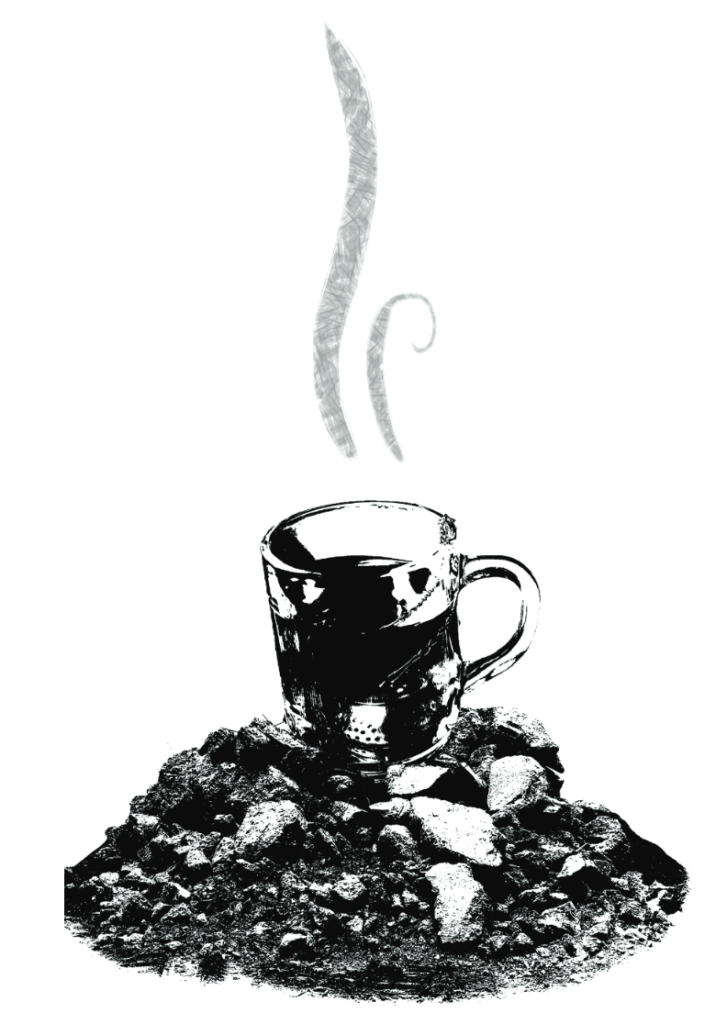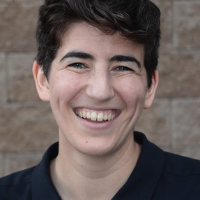The following is an excerpt from “Israel: Democracy, Race, Ethnicity, and More”
(Fragments #2).
by Sameeha Hureini, with Aliza Schwartz

Our names are Sameeha Hureini and Aliza Schwartz, and we are grateful to write together here. We met a little over two years ago in Tuwani, Sameeha’s village in Masafer Yatta, a small region in the southern West Bank that is home to nineteen Palestinian villages.
I (Aliza) was volunteering for the Storytelling Project, a project started by Palestinian and Jewish activists who had been working together for many years, with the goal of amplifying Palestinian voices from Masafer Yatta in the public sphere. I worked very closely through this project with Sameeha’s younger sister and therefore spent a lot of time in Sameeha’s warm and inviting home.
As we publish this, Sameeha is on the ground tending to the needs of her community, which is currently being targeted in retaliatory attacks by nearby Israeli settlers. I (Aliza) am in Philadelphia. We met virtually to put this piece together several months before the war began. At that point, at the core of our analysis was that our peoples need to be working together, as an “us” that includes both of us. In the aftermath of October 7, kal vachomer — even more so.
Jewish rabbinic literature and the Quran, the central holy text of Islam, have a joint teaching: Whoever destroys one life, it is written as if he has destroyed all of humanity, and whoever saves one life, it is written as if he has saved all of humanity. (Mishnah Sanhedrin 4:5; Quran 5:32)
We write here now because we care about human life. We write here now because human life is sacred — is Divine, is in the image of the Divine. We write here now because at the root and foundation of our politics and analysis is a politics of life, the absolute sacredness of life. We write here grieving the loss of so, so much human life. We write here grieving the way we seem to have forgotten that human life is sacred. Grieving the way that it seems so many of us, in moments of crisis, have hardened hearts and are not able to grieve for the other, only for us. Or so many of us are not able to grieve for us, only the other. We have come here to grieve for both.
We have come here to create a new “us.”
An us that affirms life. That is the “us.”
When that “us” is overpowered by other “us”s, we get stuck. In moments of crisis, our us, our family, our immediate people of concern, needs to be something different than what so many narratives say it is.The “us” vs. “them” is not “Jews” vs. “Palestinians” — not “Israelis” vs. “Palestinians.”
The “us” is people fighting for life, for a peace with real justice, for an end to the cycles of violence and retaliation that keep none of us safe. The “them” is the people who encourage escalation, war, and more violence.
Islamophobia is not okay with us.
Antisemitism is not okay with us.
It is not okay with us that we have been put in a position to hate and dehumanize each other — we reject that, and we work together.
As we write, Sameeha’s village, and the whole region surrounding Masafer Yatta, is facing a retaliatory increase in violence from settlers and settler-army militias. Violence against Palestinians in the West Bank has increased dramatically since October 7th. This has been very personal and hit close to home: In mid-October, an armed settler shot Sameeha’s cousin point blank as he left the village mosque after Friday prayers. He remains in the hospital until today. Blocking main access roads and using military raids, increased checkpoints, and closed military zones, the army has further limited Palestinian freedom of movement. After months of violence and threats to villages by both the Israeli military and settlers, numerous villages across the West Bank have been forced to leave their land over the past couple of months, including villages neighboring Tuwani in Masafer Yatta.
It feels more important than ever to bring you Sameeha’s story. When we know each other’s stories, our care for each other increases. When we know each others’ stories, we can build a new “us.”
The Right to Die
A Story from Sameeha, before the current war began
I am so proud to be the granddaughter of my grandmom.
My grandmom passed away last July, and it was one of the most painful things that has happened to my family. She was a central figure in our lives, giving us love and support and empowering us throughout our lives. We are very proud of her history and the difficult life that she led. This is a story about how her message, her determination, and her presence never leaves us.
My grandmom passed away at the age of 96 — she was older than the occupation, older than everything we remember — and she lived through everything: The war of 1948 (the Nakba) and the war of 1967. She was a refugee from 1948 from the village of al-Qaryatayn.
When we would sit with her to drink a cup of tea, she always told us thousands of stories. We would hear them and think, simply, “She’s the best,” and “How can she be this strong?” Her stories would help us dream about the future. But she also told us stories about getting beaten by settlers or soldiers, and when she told these, it would make all of us very, very angry. Despite what my grandmother had endured, she always encouraged us in nonviolent resistance. She would say to us, “You have to believe in what you are doing. If you are looking for peace, you have to fight in peace. Don’t attack anyone. They beat you, they attack you, you don’t beat them. You still believe in nonviolent resistance.” She would say that there are two things we should remember: “1. They have more power than us. 2. We don’t want to lose anyone.” But she always then reminded us that they only have one particular type of power. “They have the power to kill, to demolish, to stop you at checkpoints,” she would say. “But they don’t have the power to kill an idea or to tell you what to believe. You have to focus on being free, where you want to be in the future. Enjoy your day. Don’t give up even with all the violence that surrounds you.”
On the day this past July when we were taking my grandmom’s body to her final home in her land in Tuwani, the village where my whole family lives, to bury her, an Israeli army jeep came and stopped us. They said, “She is not allowed to be here — you will have to move her.”
They gave my dad a demolition order on her grave.
This is one of the most unbelievable and painful moments that I have ever experienced. It’s too difficult to even explain the feelings with words — it makes me feel weak. These days, I repeat to myself that in Masafer Yatta, we don’t even have the right to die on our own terms.
Before she died, my grandmom said to me, “Yes, I have lived a very difficult life. And I am still resisting this occupation, still shepherding. I got beaten by the settlers of Havat Ma’on. They beat me while I was trying to protect your dad, my son. I lost my eyes, my ears. But I can hear your voices. I can hear the voice of justice that is calling you, and one day you will see it. But you have to keep going. You are still young. And I’m done, and I’m so tired right now. You have to take my voice, my message — this is your responsibility. I really believe in you, and I trust you that you will be my children and will do this.”
It’s hard for me to believe that the end of my grandmom’s life involved a demolition order, that the soldiers came up to us and said we needed to move her body, not seeming to care or to be in touch about the deep mourning and grief our family was going through. This demolition order still exists now on her grave, on land she fought so hard to protect her whole life.
My grandmom is the bravest example of what it means to live in Masafer Yatta, to live in fear 24 hours a day — even, I have learned, in death. Even when you are dead, you cannot sleep in peace, because any moment the occupation bulldozers can come. Any moment they could come to my grandmom’s grave. I cannot bear to imagine that moment — if they remove my grandmom from her land and from her final resting place.
But she is seeing us now — we really do feel that her presence is with us. My grandmom is the icon of my family, and we will try to be the messengers for her and the many other elders who came before us. I will keep telling this story and their stories so we can keep them alive. Because my grandmom’s struggle is not over. We continue her peaceful fighting, and I know that she is watching — and that she is with us — as we do.

SAMEEHA HURAINI (she/her) is a Palestinian activist from the village of Tuwani in Masafer Yatta. She is 24 years old and has a degree in English Literature. She is a member of Youth of Sumud, a group that works to protect the land and people of Surura, who were violently kicked out by Israeli settlers and soldiers 24 years ago. Sameeha is an activist on behalf of Palestinian women in particular.

ALIZA SCHWARTZ (she/her) is a rabbinical student at the Reconstructionist Rabbinical College, expecting to graduate this May. She is a student member of T’ruah’s Board of Directors, and she was a T’ruah Israel Fellow. She serves as a Cooperberg-Rittmaster Rabbinical Intern at Congregation Beit Simchat Torah (CBST) in Manhattan. Aliza has been very involved in Kavod Boston (board member and President), the New Israel Fund (Assistant Director for New England) and IfNotNow.
